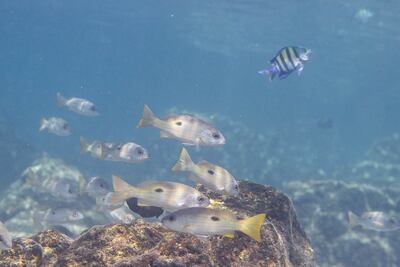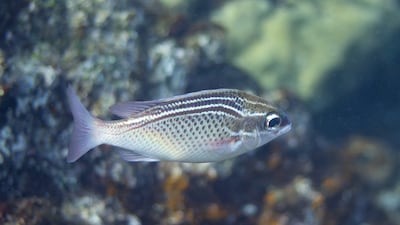Fish that live in warming waters are becoming smaller – and researchers in the UAE think they have discovered the reason why.
It had been previously been thought that difficulties in getting sufficient oxygen in warmer waters limited the size of fish in hotter climes.
However, scientists at institutions including New York University Abu Dhabi have released a report that challenges that theory.
The study suggested that fish were demonstrating a capacity to maintain adequate oxygen to survive, despite the higher than normal temperatures.
The researchers found that the important factor was getting enough energy.
So in warmer waters, larger fish tend to find it harder than smaller fish to obtain the food they need to provide their metabolism with enough energy.

“For the oxygen-limitation theory to be correct, larger individuals should be limited in oxygen supply capacity, but we found no such evidence,” Dr Jacob Johansen, an associate research professor at the Hawaii Institute of Marine Biology, one of the scientists leading the study, told The National.
“It is undoubtedly true that fish cannot survive if they are oxygen limited, so this potential hurdle must be overcome.
“Once overcome, however, our data suggest that energy acquisition becomes a primary driver for the maximum size a fish can attain.”
Their research, published in Nature Communications, comes amid concerns about fish becoming smaller as the world’s oceans heat up due to climate change.
Specimens of two species of coral reef fish, Lutjanus ehrenbergii and Scolopsis ghanam, were caught live from the Arabian Gulf, which is one of the world’s warmest seas, and from the Gulf of Oman, where temperatures are slightly lower.
Dr Johansen said that the fish were tested for their cardio-respiratory performance in “state-of-the-art laboratory systems”.
The fish were held individually in enclosed tanks that enabled the researchers to track the animals' oxygen consumption, or put in a swim chamber, compared to a treadmill for fishes, where the speed of the water current could be adjusted to see if fishing performance varied at different temperatures.
Lack of resources to grow
In the paper, Impacts of ocean warming on fish size reductions on the world’s hottest coral reefs, the researchers wrote that larger fish have “a higher per-capita resource demand” and may find it harder than smaller species to obtain enough food to satisfy the increased metabolic energy demands caused by higher temperatures.
“The fishes examined here all forage on small prey items comprised of fish, crustaceans and other invertebrates, and diets are not known to differ significantly across adult sizes,” they wrote.
“That is, a large adult will typically forage on the same nominal prey type and size as a smaller adult but will have to forage faster or longer each day to cover its higher absolute energetic demand.
“Although larger individuals can have greater tolerance to lack of food, this is not likely to bestow an advantage if smaller individuals are able to fully cover energetic demands (eg for reproduction) where larger individuals cannot, ultimately driving a selection for reductions in maximal size.”
The warming of the world’s oceans is expected to have significant effects on marine life, with knock-on effects for the fishing industry.
In their paper, the researchers said that temperature increases could cause coral reef fishes to shrink by between 14 and 39 per cent by the middle of this century.
Also leading the research was Dr John Burt, co-principal investigator at NYU Abu Dhabi’s Mubadala Arabian Centre for Climate and Environmental Sciences.
Dr Burt said that the hottest coral reefs in the world were “a natural laboratory" that allowed the researchers to collect fish from the coldest winter temperatures to the hottest summer temperatures.
Typical summer water temperatures in the Arabian Gulf are similar to those expected to be experienced at many coral reefs by the end of this century if worst-case ocean-warming predictions come to pass.
He said that the findings indicated that some fish species were more resilient to climate change than had been thought.
However, because larger fish produce far more offspring than smaller individuals of the same species, Dr Burt said that if climate change reduces the size of fishes, there could be "profound implications for the reproductive potential of fished stocks" as the ability of fish populations to replenish themselves under fishing pressure would be affected.
"While the fishing pressure 'floor' may be staying the same, the 'ceiling' of replenishment capacity is coming down, and this is something fisheries managers should be concerned with in order to avoid overexploitation," he said.
The researchers are continuing to work to understand why the maximum size of fish around the world is falling.
“The degree of shrinkage differs among species and until now, we have been unable to predict species-specific responses,” Dr Johansen said.
“This is a major dilemma for the fishing industry, for example. Our new theory provides a suite of specific hypotheses to test which, if true, will allow us to predict individual species responses.”
As well as having an effect on coral reef fishes, warming ocean temperatures are having a devastating impact on the coral itself.
The US National Oceanic and Atmospheric Administration (NOAA) revealed earlier this year that coral reefs were experiencing the fourth major recorded mass bleaching event.
Bleaching events, which involve coral expelling algae with which they have a mutually beneficial or symbiotic relationship, have been recorded in areas including the Arabian Gulf, the Red Sea, much of the South Pacific, the Caribbean and the Great Barrier Reef off Australia.


